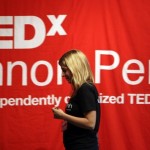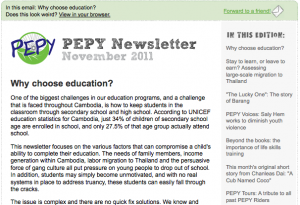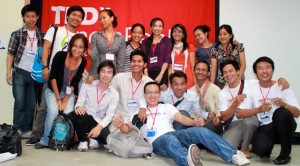 This is a guest blog post by Allie Hoffman of The Pari Project. Before I left Cambodia, Allie took over the TEDxPhnomPenh license and recently organized a team to execute Cambodia’s second TEDx event. Below she describes our motives for starting this event in the first place, how doing something “for the local people” only works if it is “with”, and how the juxtaposition of expat and local development workers can lead to interesting personal insights.
This is a guest blog post by Allie Hoffman of The Pari Project. Before I left Cambodia, Allie took over the TEDxPhnomPenh license and recently organized a team to execute Cambodia’s second TEDx event. Below she describes our motives for starting this event in the first place, how doing something “for the local people” only works if it is “with”, and how the juxtaposition of expat and local development workers can lead to interesting personal insights.
I am sad that I missed this second TEDxPhnomPenh event, but I’m proud of the team that put it together and I love learning about the impact it is continuing to make. Read on to learn about Allie’s journey through this process!
—-
From the start, TEDxPhnomPenh was about bringing the TED brand – ideas worth spreading – to Cambodia, where we thought young people were hungry for the opportunity to share, question, challenge, explore and create. Our version of TEDx was centered around young Cambodians and what the event might mean to them.
Executing the event the first time, we had a room full of 120 people who experienced 12 amazing TEDxTalks. The audience, we estimate, was 70 – 75% Khmer.
We just recently organized the second TEDx in Cambodia. This time we wanted to expand the brand, and include more people in 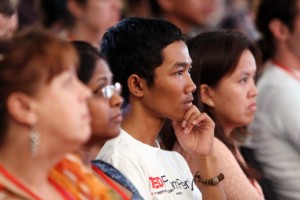 the TEDxPP experience. So we got busy planning a second event – a simulcast event – and set up a team to execute that, while the team for the live event stayed busy coaching speakers, counting tickets, and dressing up the space so it was camera ready.
the TEDxPP experience. So we got busy planning a second event – a simulcast event – and set up a team to execute that, while the team for the live event stayed busy coaching speakers, counting tickets, and dressing up the space so it was camera ready.
Two weeks before the event, the MC, Vanna Sann asked me to lunch. Everyone loved having Vanna as the MC. He is well-spoken, articulate, clever and totally in tune with the event and what we were trying to do.
He had seen the ticketing spreadsheets; the entries showed over 75% Western attendees. We had set up a system that required people to electronically submit for a ticket. We thought the system would run itself, as long as we promoted via Khmer media channels. With all of the rest of the planning going on, I had not been carefully monitoring the results.
What I had not expected was that the young Khmer population at whom we were targeting the event would not be as quick to register as their Western counterparts. Vanna was brutally honest: “I’m not doing this so that I can look out onto that audience and see a bunch of Western faces.”
Sitting at the lunch table, it felt like he was taking my internal conflicts about who I want to be in Cambodia versus who I am comfortable being, and throwing them back. It is easy to be a foreigner working in development in Phnom Penh; it’s a lot harder to push past the immediate comforts of lovely restaurants, great bars, and a lively social life – to create something enduring in a culture that I am still learning about.
I got back to the office, turned a sheet of paper over, and scribbled on the back:
Collaboration & Openness
Empowering People/Providing Opportunities
Creativity
Innovation
Seeing those words in print changed something. Over the next two weeks, we went into the database and reworked the ticketing, bringing us to 60% Khmer attendance by the time the event came around. We lost one MC, but gained another: Thul Rithy. Charismatic, funny, clever and sarcastic: he was amazing. Now he will go on to continue to lead KhmerTalks, which he founded as a way to spread the TED experience in Khmer. KhmerTalks returns to Phnom Penh on February 25th. His participation in both events brings the ‘ideas worth spreading’ movement forward significantly.
In the end, the event went off without any major glitches. The stage that day hosted 14 talks including speakers came from America, Australia, Cambodia, India, New Zealand, Spain and Singapore.
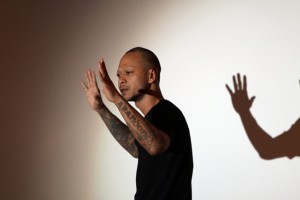 One of my favorites was Khiev Kosal. Convicted of attempted murder at age 16, he grew up in a prison system in the US that somehow allowed him to find his voice. After being deported to Cambodia upon release, he now shares his poetry via spoken word. As he got off the stage, one of our technicians was in tears. They embraced for a long time; as others crowded around to congratulate him on what had been an enormously commanding 18 minutes, they held close – complete strangers – both sharing something powerful with the other.
One of my favorites was Khiev Kosal. Convicted of attempted murder at age 16, he grew up in a prison system in the US that somehow allowed him to find his voice. After being deported to Cambodia upon release, he now shares his poetry via spoken word. As he got off the stage, one of our technicians was in tears. They embraced for a long time; as others crowded around to congratulate him on what had been an enormously commanding 18 minutes, they held close – complete strangers – both sharing something powerful with the other.
I knew leading TEDxPhnomPenh would challenge me. I didn’t expect the challenge to be so personal. Am I changed? I think so. I find myself looking at the hiring process at Pari differently, asking different questions to potential clients, staying longer in certain conversations, migrating to different people in social settings. Will it last? Here’s hoping.
—
This was a guest post by Allie Hoffman of The Pari Project.